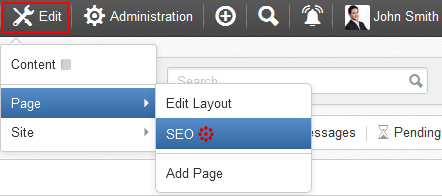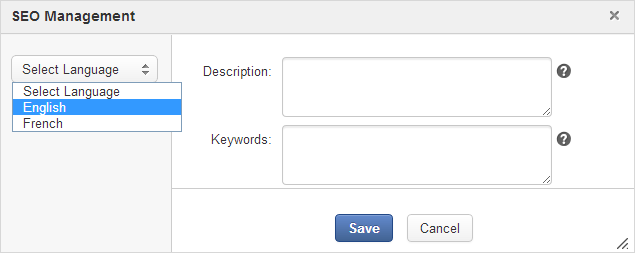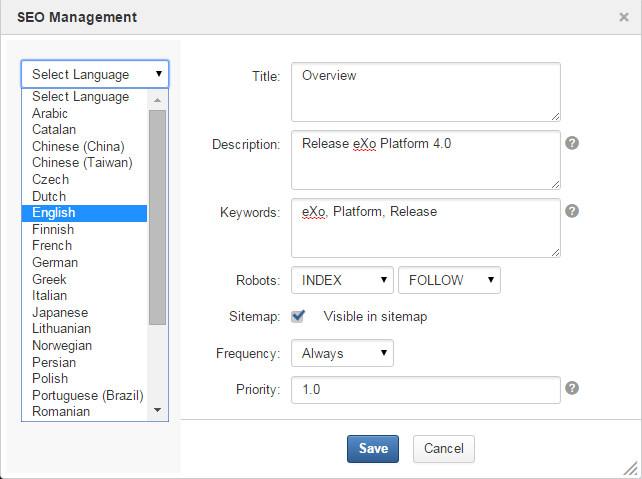SEO (Search Engine Optimization) allows you to improve the visibility of your web pages and web content in the major search engines (such as Google, Yahoo, Ask, Bing, and more) via the search results. Therefore, it is very important for the user to maximize their web pages and content's position in the search engines. In eXo Platform, the SEO Management feature is provided to meet this target. By using SEO Management, you can easily manage the SEO data of web pages and web content.
Open a page or content that you want to edit the SEO metadata.
Open the SEO Management form by clicking → → on the top navigation bar.

Depending on your SEO management for a page or content, the content of the SEO Management form will be different.
Details:
Field Description Title The title of the current page. When changed, the new title will be updated to the <title>tag of the head element of the page. TheTitleelement of your web page is very important, it should ideally optimize the SEO with a small number of keywords or key phrases.Description The description of your page/content. This description will be seen in the results list of search engines. Keywords The most important terms to describe the page, separated by commas. By using proper keywords, other users can find out your page/content via search engines more easily. Robots Search engines can access the whole directories on a website, or individual pages, or individual links on a page and list your page/content or not that depends on your options: INDEX: Allows search engines to index your page/content on the search engine results page.
NOINDEX: Restricts search engines from indexing your page/content on the search engine results page. Use this option if you want to keep your page private.
FOLLOW: Allows search engines to follow links from your page to find other pages.
NOFOLLOW: Restricts search engines from following links from your page to find other pages. Use this option if you want to prevent spam links in comments of blogs, forums and others.
Sitemap Allows you to see pages of the sites in the tree-like structure. Frequency Shows how often pages are updated on the site. Also, setting your frequency levels tells the search engines which pages should be crawled over other pages. The frequency levels include: Always, Hourly, Daily, Weekly, Monthly, Yearly and Never. If you set "Never" for the frequency level, meaning that this page never gets updated, so search engines will move onto other pages that get updated more frequently. Priority Allows search engines to search the page with the higher priority level first. The acceptable value in this field is from 0 to 1. In which, 0 is the lowest priority level and 1 is the highest. 
Allows you to add the localization for SEO metadata. You can choose the language from the drop-down list. 
Allows you to remove the SEO metadata for a respective language. 
Gives the meaning or requirement of each field. Fill out all fields in this form.
Click to finish creating SEO metadata.
Note
If no language has been selected, the default portal language will be used after saving.
 means that the SEO information is empty.
means that the SEO information is empty.
 means that the SEO information has been updated but some information are not filled out yet.
means that the SEO information has been updated but some information are not filled out yet.
 means that the
SEO Management
form is filled out with the full SEO information.
means that the
SEO Management
form is filled out with the full SEO information.
 means that the
SEO Management
feature is disabled.
means that the
SEO Management
feature is disabled.

